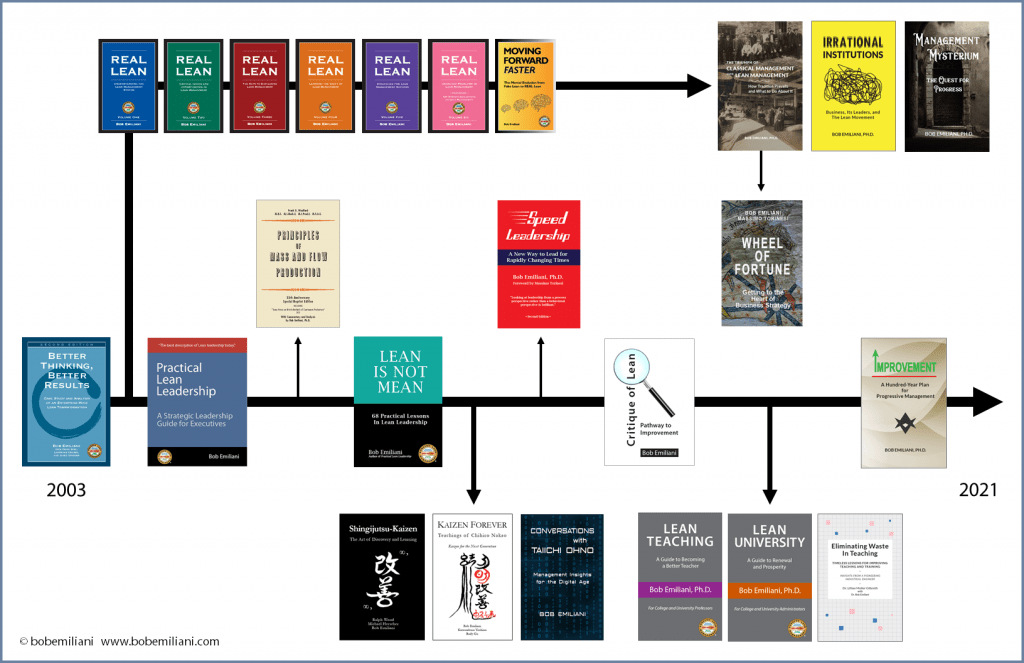
What was the purpose of writing 24 books? It was equal parts an intense personal curiosity, a desire to share what I have learned with others, and to make it easier for leaders to understand and practice progressive management. It is the last of these — to make it easier for leaders to understand and practice progressive management — that I hope is the legacy of my work. I also hope that the uniqueness of these works, individually and in total, as well as the integration of practical and scholarly rigor, will someday be more fully apprehended.
The top row in the image above are books resulting from an extended (13 year) study of a 130-year-old problem: Why do most top leaders resist or reject progressive management? In our time, the forms of progressive management in question are Toyota management and its derivative, Lean management. In earlier times, it was Scientific Management. More generally, the books answer the question of why most leaders resist or reject organizational change and improvement, and how and why the antiquated institution of leadership remains firmly in control. The study culminated in these groundbreaking three books:
- The Triumph of Classical Management Over Lean Management: How Tradition Prevails and What to Do About It
- Irrational Institutions: Business, Its Leaders, and The Lean Movement
- Management Mysterium: The Quest for Progress
These are followed by a capstone book that serves as a guide to those in the machine-dominated future who will revive progressive, human-centered management, to help them avoid repeating the many mistakes of the past:
These next two books reimagine leadership and business strategy. The former offers a simple pathway for leadership development while the latter carefully examines the role and value of business strategy in relation to the institution of leadership (i.e., strategy as a social construct):
- Speed Leadership: A New Way to Lead for Rapidly Changing Times
- Wheel of Fortune: Getting to the Heart of Business Strategy
Next comes two books about Lean transformation and Lean leadership. The first is award winning book about the enterprise-wide transformation is a real company, and the second is a workbook that explains what a Lean leader is, how Lean leaders think and behave, and what they do:
- Better Thinking, Better Results: Case Study and Analysis of an Enterprise-Wide Lean Transformation
- Practical Lean Leadership: A Strategic Leadership Guide for Executives
As kaizen was the method by which Toyota’s production system and its overall management system were created, it was important to write about this very important topic to help people better understand the method and appreciate its fundamental importance in modern progressive management:
- Kaizen Forever: Teachings of Chihiro Nakao
- Shingijutsu-Kaizen: The Art of Discovery and Learning
- Conversations with Taiichi Ohno: Management Insights for the Digital Age
Since my profession post-industry has been an educator, I took what I learned from Shingijutsu about kaizen and TPS and applied it to university teaching and administration:
- Lean Teaching: A Guide to Becoming a Better Teacher
- Lean University: A Guide to Renewal and Prosperity
Finally, I revived great forgotten works by Frank George Woollard, a key figure in the U.K. auto industry in the 1920s and 1930s, and a previously unpublished work by the world-famous industrial engineer and psychologist, Dr. Lillian Gilbreth, in which I have added extensive analysis and commentary to both works:
- Principles of Mass and Flow Production
- Eliminating Waste in Teaching: Timeless Lessons for Improving Teaching and Training
Doing this work for the last 18 years has been a true labor of a great love: a deeply empathetic interest to make things better for humanity — especially for workers — and to expand prosperity, but doing so in much less wasteful ways. It has been a tremendous joy to engage the nexus of progressive thinking and practice (in industry, teaching, and executive training), research, and writing. It is now time to move on from writing books to engaging people in other ways.
